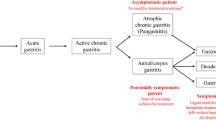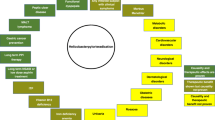Abstract
Gastric colonization by Helicobacter pylori is associated with the development of chronic gastroduodenal disorders, including atrophic gastritis, duodenal ulcer, and gastric cancer. Mainly over the last three decades, exemplary research efforts and clinical trials have been aimed at achieving the best formulation and treatment regimens for mass eradication of H. pylori. Reflecting on these efforts, we would like to pose the following questions: Is it mandatory to aim for eradication of all H. pylori strains or only specific strains thereof? What populations should be selected for antibiotic therapy? Until now, the screen-and-treat strategy has been the best recommendation by the guidelines for clinicians caring for patients from high-risk populations, but targeting the virulent strains of H. pylori had not been considered. However, updated guidelines based on renewed concepts to improve H. pylori treatment could help clinicians better manage their patients who suffer from gastric cancer. Importantly, preventing gastric cancer will not be feasible by the screen-and-test strategy alone. Here, we present a commentary proposing a renewed consideration of H. pylori screening and treatment and their potential impact on H. pylori eradication in anticipation of preventing gastric cancer.
Similar content being viewed by others
References
Watanabe, T., Tada, M., Nagai, H., Sasaki, S., & Nakao, M. (1998). Helicobacter pylori infection induces gastric cancer in mongolian gerbils. Gastroenterology, 115(3), 642–648. https://doi.org/10.1016/s0016-5085(98)70143-x.
Noto, J. M., Romero-Gallo, J., Piazuelo, M. B., & Peek, R. M. (2016). The Mongolian Gerbil: a robust model of Helicobacter pylori-induced gastric inflammation and cancer. In Gastrointestinal Physiology and Diseases (pp. 263–280). Springer.
Shimizu, N., Ikehara, Y., Inada, K., Nakanishi, H., Tsukamoto, T., Nozaki, K., Kaminishi, M., Kuramoto, S., Sugiyama, A., Katsuyama, T., & Tatematsu, M. (2000). Eradication diminishes enhancing effects of Helicobacter pylori infection on glandular stomach carcinogenesis in Mongolian gerbils. Cancer Research, 60(6), 1512–1514.
Venerito, M., Link, A., Rokkas, T., & Malfertheiner, P. (2019). Review: Gastric cancer—clinical aspects. Helicobacter, 24(Suppl 1), e12643. https://doi.org/10.1111/hel.12643.
Bray, F., Ferlay, J., Soerjomataram, I., Siegel, R. L., Torre, L. A., & Jemal, A. (2018). Global cancer statistics 2018: GLOBOCAN estimates of incidence and mortality worldwide for 36 cancers in 185 countries. CA: a Cancer Journal for Clinicians, 68(6), 394–424. https://doi.org/10.3322/caac.21492.
Fitzmaurice, C., Allen, C., Barber, R. M., Barregard, L., Bhutta, Z. A., Brenner, H., Dicker, D. J., Chimed-Orchir, O., Dandona, R., Dandona, L., Fleming, T., Forouzanfar, M. H., Hancock, J., Hay, R. J., Hunter-Merrill, R., Huynh, C., Hosgood, H. D., Johnson, C. O., Jonas, J. B., Khubchandani, J., Kumar, G. A., Kutz, M., Lan, Q., Larson, H. J., Liang, X., Lim, S. S., Lopez, A. D., MacIntyre, M. F., Marczak, L., Marquez, N., Mokdad, A. H., Pinho, C., Pourmalek, F., Salomon, J. A., Sanabria, J. R., Sandar, L., Sartorius, B., Schwartz, S. M., Shackelford, K. A., Shibuya, K., Stanaway, J., Steiner, C., Sun, J., Takahashi, K., Vollset, S. E., Vos, T., Wagner, J. A., Wang, H., Westerman, R., Zeeb, H., Zoeckler, L., Abd-Allah, F., Ahmed, M. B., Alabed, S., Alam, N. K., Aldhahri, S. F., Alem, G., Alemayohu, M. A., Ali, R., Al-Raddadi, R., Amare, A., Amoako, Y., Artaman, A., Asayesh, H., Atnafu, N., Awasthi, A., Saleem, H. B., Barac, A., Bedi, N., Bensenor, I., Berhane, A., Bernabe, E., Betsu, B., Binagwaho, A., Boneya, D., Campos-Nonato, I., Castaneda-Orjuela, C., Catala-Lopez, F., Chiang, P., Chibueze, C., Chitheer, A., Choi, J. Y., Cowie, B., Damtew, S., das Neves, J., Dey, S., Dharmaratne, S., Dhillon, P., Ding, E., Driscoll, T., Ekwueme, D., Endries, A. Y., Farvid, M., Farzadfar, F., Fernandes, J., Fischer, F., GH, T. T., Gebru, A., Gopalani, S., Hailu, A., Horino, M., Horita, N., Husseini, A., Huybrechts, I., Inoue, M., Islami, F., Jakovljevic, M., James, S., Javanbakht, M., Jee, S. H., Kasaeian, A., Kedir, M. S., Khader, Y. S., Khang, Y. H., Kim, D., Leigh, J., Linn, S., Lunevicius, R., HMA, E. R., Malekzadeh, R., Malta, D. C., Marcenes, W., Markos, D., Melaku, Y. A., Meles, K. G., Mendoza, W., Mengiste, D. T., Meretoja, T. J., Miller, T. R., Mohammad, K. A., Mohammadi, A., Mohammed, S., Moradi-Lakeh, M., Nagel, G., Nand, D., Le Nguyen, Q., Nolte, S., Ogbo, F. A., Oladimeji, K. E., Oren, E., Pa, M., Park, E. K., Pereira, D. M., Plass, D., Qorbani, M., Radfar, A., Rafay, A., Rahman, M., Rana, S. M., Soreide, K., Satpathy, M., Sawhney, M., Sepanlou, S. G., Shaikh, M. A., She, J., Shiue, I., Shore, H. R., Shrime, M. G., So, S., Soneji, S., Stathopoulou, V., Stroumpoulis, K., Sufiyan, M. B., Sykes, B. L., Tabares-Seisdedos, R., Tadese, F., Tedla, B. A., Tessema, G. A., Thakur, J. S., Tran, B. X., Ukwaja, K. N., BSC, U., Vlassov, V. V., Weiderpass, E., Wubshet Terefe, M., Yebyo, H. G., Yimam, H. H., Yonemoto, N., Younis, M. Z., Yu, C., Zaidi, Z., MES, Z., Zenebe, Z. M., CJL, M., & Naghavi, M. (2017). Global, regional, and national cancer incidence, mortality, years of life lost, years lived with disability, and disability-adjusted life-years for 32 cancer groups, 1990 to 2015: a systematic analysis for the global burden of disease study. JAMA Oncology, 3(4), 524–548. https://doi.org/10.1001/jamaoncol.2016.5688.
Eghdami, A., Ostovar, R., Jafari, A., Palmer, A. J., Bordbar, N., & Ravangard, R. (2019). Economic burden of gastric cancer: a case study of Iran. Cancer Control, 26(1), 1073274819837185. https://doi.org/10.1177/1073274819837185.
den Hoed, C. M., & Kuipers, E. J. (2016). Gastric cancer: how can we reduce the incidence of this disease? Current Gastroenterology Reports, 18(7), 34. https://doi.org/10.1007/s11894-016-0506-0.
Chey, W. D., Wong, B. C., & Practice Parameters Committee of the American College of Gastroenterology. (2007). American College of Gastroenterology guideline on the management of Helicobacter pylori infection. The American Journal of Gastroenterology, 102(8), 1808–1825. https://doi.org/10.1111/j.1572-0241.2007.01393.x.
Fock, K. M., Katelaris, P., Sugano, K., Ang, T. L., Hunt, R., Talley, N. J., Lam, S. K., Xiao, S. D., Tan, H. J., Wu, C. Y., Jung, H. C., Hoang, B. H., Kachintorn, U., Goh, K. L., Chiba, T., Rani, A. A., & Second Asia-Pacific, C. (2009). Second Asia–Pacific Consensus Guidelines for Helicobacter pylori infection. Journal of Gastroenterology and Hepatology, 24(10), 1587–1600. https://doi.org/10.1111/j.1440-1746.2009.05982.x.
Chey, W. D., Leontiadis, G. I., Howden, C. W., & Moss, S. F. (2017). ACG clinical guideline: treatment of Helicobacter pylori infection. The American Journal of Gastroenterology, 112(2), 212–239. https://doi.org/10.1038/ajg.2016.563.
Kim, Y. I., Cho, S. J., Lee, J. Y., Kim, C. G., Kook, M. C., Ryu, K. W., Kim, Y. W., & Choi, I. J. (2016). Effect of Helicobacter pylori eradication on long-term survival after distal gastrectomy for gastric cancer. Cancer Research and Treatment, 48(3), 1020–1029. https://doi.org/10.4143/crt.2015.264.
Wu, J. Y., Lee, Y. C., & Graham, D. Y. (2019). The eradication of Helicobacter pylori to prevent gastric cancer: a critical appraisal. Expert Review of Gastroenterology & Hepatology, 13(1), 17–24. https://doi.org/10.1080/17474124.2019.1542299.
Zeng, M., Mao, X. H., Li, J. X., Tong, W. D., Wang, B., Zhang, Y. J., Guo, G., Zhao, Z. J., Li, L., Wu, D. L., Lu, D. S., Tan, Z. M., Liang, H. Y., Wu, C., Li, D. H., Luo, P., Zeng, H., Zhang, W. J., Zhang, J. Y., Guo, B. T., Zhu, F. C., & Zou, Q. M. (2015). Efficacy, safety, and immunogenicity of an oral recombinant Helicobacter pylori vaccine in children in China: a randomised, double-blind, placebo-controlled, phase 3 trial. Lancet, 386(10002), 1457–1464. https://doi.org/10.1016/S0140-6736(15)60310-5.
Liu, W., Zeng, Z., Luo, S., Hu, C., Xu, N., Huang, A., Zheng, L., Sundberg, E. J., Xi, T., & Xing, Y. (2019). Gastric subserous vaccination with Helicobacter pylori vaccine: an attempt to establish tissue-resident CD4+ memory T cells and induce prolonged protection. Frontiers in Immunology, 10, 1115. https://doi.org/10.3389/fimmu.2019.01115.
Fischbach, W., & Malfertheiner, P. (2018). Helicobacter Pylori infection: when to eradicate, how to diagnose and treat. Deutsches Ärzteblatt International, 115(25), 429.
Malfertheiner, P., Megraud, F., O'Morain, C. A., Atherton, J., Axon, A. T., Bazzoli, F., Gensini, G. F., Gisbert, J. P., Graham, D. Y., Rokkas, T., El-Omar, E. M., Kuipers, E. J., & European Helicobacter Study G. (2012). Management of Helicobacter pylori infection—The Maastricht IV/ Florence consensus report. Gut, 61(5), 646–664. https://doi.org/10.1136/gutjnl-2012-302084.
Malfertheiner, P., Megraud, F., O’Morain, C. A., Gisbert, J. P., Kuipers, E. J., Axon, A. T., Bazzoli, F., Gasbarrini, A., Atherton, J., Graham, D. Y., Hunt, R., Moayyedi, P., Rokkas, T., Rugge, M., Selgrad, M., Suerbaum, S., Sugano, K., El-Omar, E. M., & European H, Microbiota Study G, Consensus p. (2017). Management of Helicobacter pylori infection—the Maastricht V/Florence Consensus Report. Gut, 66(1), 6–30. https://doi.org/10.1136/gutjnl-2016-312288.
Thung, I., Aramin, H., Vavinskaya, V., Gupta, S., Park, J. Y., Crowe, S. E., & Valasek, M. A. (2016). Review article: the global emergence of Helicobacter pylori antibiotic resistance. Alimentary Pharmacology & Therapeutics, 43(4), 514–533. https://doi.org/10.1111/apt.13497.
Graham, D. Y., & Yamaoka, Y. (2000). Disease-specific Helicobacter pylori virulence factors: the unfulfilled promise. Helicobacter, 5 Suppl 1(S1), S3–S9 discussion S27-31.
Lu, H., Yamaoka, Y., & Graham, D. Y. (2005). Helicobacter pylori virulence factors: facts and fantasies. Current Opinion in Gastroenterology, 21(6), 653–659.
Yamaoka, Y. (2010). Mechanisms of disease: Helicobacter pylori virulence factors. Nature Reviews. Gastroenterology & Hepatology, 7(11), 629–641. https://doi.org/10.1038/nrgastro.2010.154.
Arachchi, H. S., Kalra, V., Lal, B., Bhatia, V., Baba, C. S., Chakravarthy, S., Rohatgi, S., Sarma, P. M., Mishra, V., Das, B., & Ahuja, V. (2007). Prevalence of duodenal ulcer-promoting gene (dupA) of Helicobacter pylori in patients with duodenal ulcer in North Indian population. Helicobacter, 12(6), 591–597. https://doi.org/10.1111/j.1523-5378.2007.00557.x.
Salimzadeh, L., Bagheri, N., Zamanzad, B., Azadegan-Dehkordi, F., Rahimian, G., Hashemzadeh-Chaleshtori, M., Rafieian-Kopaei, M., Sanei, M. H., & Shirzad, H. (2015). Frequency of virulence factors in Helicobacter pylori-infected patients with gastritis. Microbial Pathogenesis, 80, 67–72. https://doi.org/10.1016/j.micpath.2015.01.008.
Dore, M. P., Lu, H., & Graham, D. Y. (2016). Role of bismuth in improving Helicobacter pylori eradication with triple therapy. Gut, 65(5), 870–878. https://doi.org/10.1136/gutjnl-2015-311019.
Author information
Authors and Affiliations
Corresponding author
Ethics declarations
Conflict of Interest
The authors declare that they have no conflict of interest.
Additional information
Publisher’s Note
Springer Nature remains neutral with regard to jurisdictional claims in published maps and institutional affiliations.
Rights and permissions
About this article
Cite this article
Rahimi, F., Talebi Bezmin Abadi, A. Tracking the Virulent Helicobacter pylori Strains Instead of Its Pan-Screening to Prevent Gastric Cancer. BioNanoSci. 10, 315–317 (2020). https://doi.org/10.1007/s12668-019-00678-0
Published:
Issue Date:
DOI: https://doi.org/10.1007/s12668-019-00678-0




